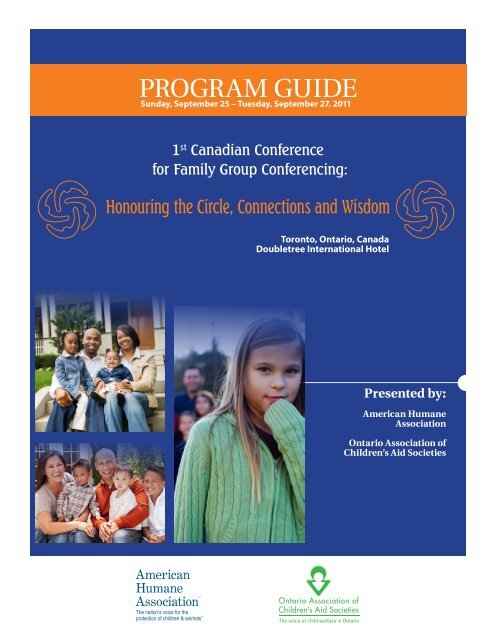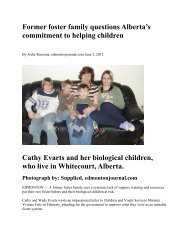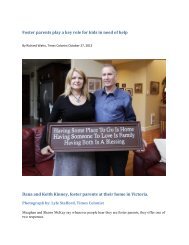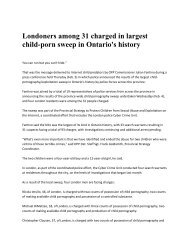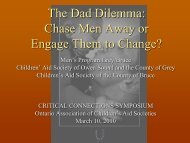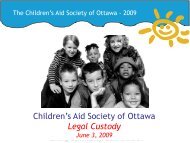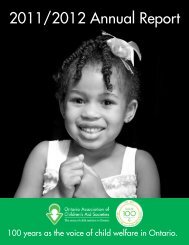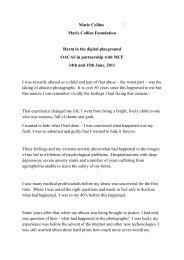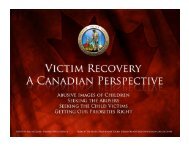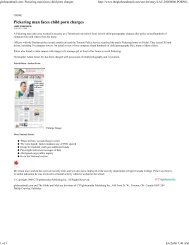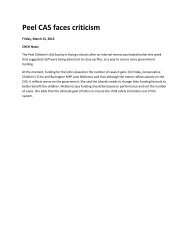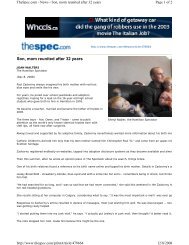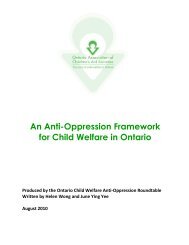PROGRAM GUIDE - American Humane Association
PROGRAM GUIDE - American Humane Association
PROGRAM GUIDE - American Humane Association
You also want an ePaper? Increase the reach of your titles
YUMPU automatically turns print PDFs into web optimized ePapers that Google loves.
<strong>PROGRAM</strong> <strong>GUIDE</strong><br />
Sunday, September 25 – Tuesday, September 27, 2011<br />
1 st Canadian Conference<br />
for Family Group Conferencing:<br />
Honouring the Circle, Connections and Wisdom<br />
Toronto, Ontario, Canada<br />
Doubletree International Hotel<br />
Presented by:<br />
<strong>American</strong> <strong>Humane</strong><br />
<strong>Association</strong><br />
Ontario <strong>Association</strong> of<br />
Children’s Aid Societies
Honouring the Circle, Connections and Wisdom<br />
1 st Canadian Conference<br />
for Family Group Conferencing:<br />
Honouring the Circle, Connections and Wisdom<br />
For almost 15 years, <strong>American</strong> <strong>Humane</strong> <strong>Association</strong><br />
has been a leader in developing family group<br />
decision making (FGDM) as a system reform for<br />
promoting and supporting family and community<br />
involvement and leadership in decision making<br />
about children who need protection or care. We<br />
provide training and technical assistance, research<br />
and resources to communities implementing<br />
FGDM across the U.S., Canada and many of the<br />
other 23 countries implementing FGDM as a way to<br />
transform systems.<br />
Since 1912, the Ontario <strong>Association</strong> of Children’s<br />
Aid Societies (OARCAS) has represented Children’s<br />
Aid Societies in Ontario and provided service in the<br />
areas of government relations, communications,<br />
information management, education and training<br />
to advocate for the protection and well-being of<br />
children. OACAS is the voice of child welfare in<br />
Ontario.<br />
Canadian professionals have received ad hoc<br />
training in the provinces and have travelled to the<br />
U.S. to receive training and to attend the annual<br />
FGDM conference and skills institutes. At the<br />
June 2009 <strong>American</strong> <strong>Humane</strong> <strong>Association</strong> FGDM<br />
Conference., Canadian practitioners expressed an<br />
interest in a “made in Canada” conference. Many<br />
conversations with Canadian leaders in a variety of<br />
sectors about the desire for such an event ensued,<br />
and partnerships were formed across national<br />
and provincial boundaries in order to design<br />
this event. The result is a two-day conference,<br />
presented by <strong>American</strong> <strong>Humane</strong> <strong>Association</strong> and<br />
the Ontario <strong>Association</strong> of Children’s Aid Societies,<br />
in collaboration with The George Hull Centre.<br />
Special Collaborator:<br />
Purpose of the Conference<br />
Collectively, we view this conference as an<br />
opportunity to partner with international and<br />
national leaders, further learning about FGC and<br />
share the wisdom related to this type of service.<br />
With the widespread use of FGC throughout<br />
Canada, but the limited opportunities to dialogue<br />
across provinces or territories, this conference<br />
provides the opportunity to network and learn from<br />
one another within the Canadian context.<br />
We also see value in including the opportunity<br />
to showcase and extend learning opportunities<br />
about existing traditional models established in<br />
the Aboriginal communities of First Nations, Métis<br />
and Inuit Peoples similar to the foundations of FGC.<br />
Aboriginal approaches across North America, such<br />
as but not limited to original dispute resolution and<br />
talking circles, are included as a program stream.<br />
Simply put, Honouring the Circle, Connections and<br />
Wisdom is about professionals coming together,<br />
making connections between honoured traditions<br />
and emerging practice wisdom in working with<br />
children, families and their communities.<br />
The purposes of the conference are to:<br />
• Bring together professionals practicing<br />
or desiring to learn about FGC to expand<br />
knowledge of this system reform.<br />
• Increase knowledge about Aboriginal<br />
approaches in Ontario and other Canadian<br />
provinces, and their use in achieving<br />
culturally appropriate results for Aboriginal<br />
children and families, including those<br />
served by designated Aboriginal Children’s<br />
Aid Societies, and especially those served by<br />
non-Aboriginal agencies.<br />
• Introduce, share and develop skills and<br />
experience in FGC and Canadian First<br />
Nations, Métis and Inuit practices.<br />
1 st Canadian Conference for Family Group Conferencing 2
Honouring the Circle, Connections and Wisdom<br />
History and Context: Family Group Conferencing/<br />
FGDM in Canada<br />
The first Canadian initiative was a demonstration<br />
project in Newfoundland and Labrador in 1995-<br />
1996 by Dr. Joan Pennell and Gale Burford at<br />
Memorial University. Their focus was on using<br />
FGDM for families who experienced domestic<br />
violence. In 1997, a pilot project was established<br />
in Calgary.<br />
Also in 1997, two family group conferencing<br />
(FGC) projects in Manitoba were established, one<br />
in Dauphin and one in Winnipeg, based at local<br />
friendship centres. FGC is currently being offered<br />
in four locations in Manitoba.<br />
In 2002, the first Canadian child welfare<br />
legislation on FGC was passed in British<br />
Columbia (Child, Family and Community Service<br />
Act, 1996) and in Newfoundland (Child, Youth and<br />
Family Services Act, 1998). British Columbia began<br />
using FGC in late 2002 and is now supported by<br />
both legislation and policy (Ministry of Children<br />
and Family Development, 2008). Newfoundland<br />
has not yet established an FGC practice. FGC<br />
projects have also been established in Alberta<br />
and Nova Scotia.<br />
New Brunswick enacted amendments to its<br />
child welfare legislation in 2009 (Family Services<br />
Act, 1983) requiring child protection services<br />
to consider FGC and FGC practice standards<br />
(Department of Social Development, 2008)<br />
as part of its system-wide reform of the child<br />
welfare service. Yukon passed new child welfare<br />
legislation (2008) which requires that a family be<br />
offered a family conference or other cooperative<br />
planning processes for children involved with<br />
child welfare services.<br />
As part of a provincial transformation of<br />
Child Welfare in 2006, the Province of Ontario<br />
proclaimed amendments to the Child and Family<br />
Services Act which required child protection<br />
agencies to consider using an alternative<br />
dispute resolution method that included FGC/<br />
FGDM as an approved method. Since that time,<br />
FGC/FGDM service began to spread across<br />
Ontario. The FGC Ontario Provincial Resource<br />
was established at The George Hull Centre in<br />
2006 to act as a provincial locus of expertise<br />
and best practice, overseeing model integrity,<br />
coordinating training to FGC service providers<br />
and community partners, and maintaining a<br />
roster of FGC coordinators, trainers and mentors.<br />
Indigenous Practices: While FGC has evolved<br />
as a disciple in North America, there are many<br />
indigenous practices that are part of original<br />
tradition and culture and have been used by<br />
First Nations for hundreds — if not thousands—<br />
of years. Much of this practice is similar to the<br />
origins of Family Group Decision Making, and<br />
included talking circles, healing circles and<br />
the use of stories and symbols. Across Canada<br />
Aboriginal peoples still use these practices<br />
to enable healing for children, families and<br />
communities. This conference incorporates<br />
many such practices and allows Indigenous<br />
peoples to share their unique helping practices<br />
with others including those who are practicing<br />
FGDM/FGC.<br />
The first FGC program launched in Ontario was<br />
the FGC Project of Toronto in 1998, at The George<br />
Hull Centre, in collaboration with child welfare<br />
and children mental health agencies, which<br />
is now well-established in the metro Toronto<br />
area. This was followed by a pilot project at The<br />
Children’s Aid Society of Brant in 2002, which<br />
developed into an established FGC/FGDM<br />
service. During 2004-2005, several other FGC/<br />
FGDM services were established in London,<br />
Simcoe County and Sault Ste. Marie.<br />
3<br />
1 st Canadian Conference for Family Group Conferencing
Honouring the Circle, Connections and Wisdom<br />
Diverse Learning Opportunities to Meet Everyone’s Needs<br />
Conference participants will enjoy a variety of ways to explore community<br />
partnership building, the intersection between practice and values,<br />
organizational and systems change, research and evaluation, and learning<br />
across systems. Opportunities include:<br />
• Pre-conference full-day skills institutes and intensive seminars<br />
• Plenary speakers<br />
• 30+ workshops<br />
• Interaction with colleagues from around the world<br />
Who Should Attend<br />
The conference program has a plethora of workshops for administrators,<br />
supervisors, practitioners, judges, legal professionals, policymakers,<br />
researchers/evaluators, advocates and family members. Presentations will<br />
be organized to follow one of the following tracks and have varying levels,<br />
as determined by the presenters:<br />
Track 1. Innovative Practices and Developments<br />
Track 2. Youth and Family Engagement<br />
Track 3. Collaboration and Implementation Within and Across Systems<br />
Track 4. Implementation: Building a Strong and Sustainable Foundation<br />
Track 5. Culture, Privilege, Bias and Power<br />
Track 6. Aboriginal Practices<br />
Registration<br />
Registration for the conference is C$425. Your registration fee covers<br />
conference materials, all conference workshops, and a continental breakfast<br />
and lunch on each of the two conference days. The registration fee for the<br />
Skills Institute is C$95 and includes lunch. For more information or to<br />
register please visit www.oacas.org/circle.<br />
1 st Canadian Conference for Family Group Conferencing 4
Honouring the Circle, Connections and Wisdom<br />
Skills Institutes<br />
and Intensive<br />
Seminars<br />
Preserving the Integrity of<br />
FGC in the Sea of Family<br />
Engagement Meetings<br />
Sheila Robinson,<br />
Ministry of Children and<br />
Family Development,<br />
Vancouver, BC, Canada<br />
Sunday, September 25, 2011<br />
10 A.M. – 5:30 P.M. (Lunch on your own)<br />
Over the last number of years, a number of family engagement strategies<br />
have been developed to augment the traditional FGC process. The reasons<br />
for developing other family engagement meetings have differed across<br />
jurisdictions, but have included: the family’s need to bring people together<br />
in urgent situations, timeliness, engaging families at the “front door” of<br />
the child welfare system, agency resources and finding family early in the<br />
child welfare process. The development of the family engagement process<br />
are well intentioned and often very effective; however, the question arises<br />
of how we can maintain the integrity of the FGC methodology when<br />
faced with other processes that, on the surface, can appear to be easier,<br />
more efficient and, some would argue, achieve the same outcomes. This<br />
skills workshop will explore the development of the family engagement<br />
strategies and look at them in context of child welfare service delivery. The<br />
workshop will provide some practical tips and strategies for agencies and<br />
practitioners to employ in order to preserve the FGC methodology when<br />
facing the challenge of increasing numbers of other family engagement<br />
strategies. Most importantly, the facilitator will discuss the value of FGC<br />
and why it should be preserved as a separate and distinct process.<br />
Focus on Follow-Up<br />
Anita Horner,<br />
<strong>American</strong> <strong>Humane</strong> <strong>Association</strong>,<br />
Englewood, Colo., USA<br />
Why is follow-up vital to the successful implementation of the plan? What<br />
does follow-up really entail? How does a follow-up conference differ from<br />
an initial conference? How can effective follow-up occur while continuing<br />
to support a family-driven process? This skills institute will address<br />
these questions and other follow-up related topics, through didactic<br />
presentation, group activities and discussion, where participants will<br />
explore how to inform and enhance individual and system-wide practice.<br />
This institute will focus on defining and more thoroughly understanding<br />
the function and vital role of the follow-up component of the FGC/FGDM<br />
process, and how it directly impacts the successful implementation of<br />
the plan after an FGC is held. Through group activities and discussion,<br />
participants will consider how to inform and educate family groups,<br />
coordinators, service providers, communities and organizational systems<br />
about how to support and implement effective follow-up efforts, while<br />
maintaining a family-driven process that is reflective of FGC values and<br />
philosophy.<br />
1 st Canadian Conference for Family Group Conferencing 5
Honouring the Circle, Connections and Wisdom<br />
Social Worker Role in<br />
Information Sharing<br />
Suzanne Lohrbach,<br />
<strong>American</strong> <strong>Humane</strong> <strong>Association</strong>,<br />
Englewood, Colo., USA<br />
Social workers are expected to share relevant information during an<br />
FGC; however, there has been much discussion and often confusion<br />
around what that information ought to be and how it can best be<br />
presented. Given that the information sharing phase likely represents the<br />
shortest period of time, it is important that the presenting social worker/<br />
supervisor/practitioner be clear and concise about that information<br />
and that it is communicated in terms that are understandable to the<br />
family. Questions must also be responded to so that the family is well<br />
equipped to go into private time to develop a plan/make a decision. This<br />
workshop will include the examination of what “relevant” information<br />
means, how to be direct and straightforward in presenting information,<br />
clear discussion of any non-negotiable items, and response to family<br />
questions. Preparation is the key to a constructive and successful FGC<br />
in terms of the development of workable plans and decision making<br />
specific to child safety and well-being. This institute will address decision<br />
making regarding from whom the statutory agency to have present in<br />
person or to have available by phone given any particular needs around<br />
plan approval/enhancement. There will be opportunities to practice<br />
information sharing and delivery of information that is difficult in nature,<br />
as well as a number of other skills.<br />
Getting Power to Frontline<br />
Workers: The Agency<br />
Contribution to Effective<br />
FGDM Practice<br />
Michael Doolan, <strong>American</strong><br />
<strong>Humane</strong> <strong>Association</strong> Fellow,<br />
Christchurch, New Zealand<br />
FGDM success is predicated on the empowerment of frontline workers<br />
to enter into transparent and flexible negotiation with families about<br />
their issues and their needs. This means that authority and resource<br />
control and allocation must be in the hands of workers, with agencies<br />
providing the guidance and support they need to ensure that families<br />
are able to formulate effective plans for their children. The failure of<br />
agencies to adapt and modify their systems and procedures in order<br />
to promote this new way of working is a barrier to mainstreaming the<br />
practice. This seminar is suitable for managers, service leaders and team<br />
leaders who are in positions of influence and can promote the change or<br />
adaptation of organizational systems and behaviors. In the course of the<br />
day, participants will consider strategies for entrenching the values and<br />
principles underpinning FGC in the policies, procedures, practices and<br />
systems of statutory child welfare agencies. Agency leaders and managers<br />
can make a difference if they have the will to do so.<br />
1 st Canadian Conference for Family Group Conferencing 6
Honouring the Circle, Connections and Wisdom<br />
How do we maintain FGC<br />
principles/values in our<br />
practice?<br />
Daniel Bogue, The George Hull<br />
Centre, Toronto, ON, Canada<br />
and Gale Burford, University of<br />
Vermont, Burlington, Vt.<br />
FGC practice in child welfare is paradoxical. Building relational safety<br />
and permanency for children depends on responsively engaging the<br />
family’s culture and strengths, including their leadership, while at the<br />
same time holding true to the principles and values that underwrite<br />
the practice. On one hand, this requires a high level of consensus and<br />
ongoing renewal of the principles and values among FGC coordinators<br />
and participating professionals including child welfare professionals,<br />
mental health professionals, educators, legal professionals and police<br />
officers, substitute care providers, supervisors, administrators and those<br />
who work to align policy and practice. This requires ongoing education<br />
for new hires and renewal to hold the practice accountable to those<br />
most affected. As experienced practitioners, educators and learners, we<br />
develop all kinds of micro practices that become habitual even those<br />
that have grown from our own accumulated skills, knowledges — even<br />
our successes — that we develop over the years. How do we stay ‘fresh’<br />
and focus on what ‘can be’ in each engagement; safeguard against the<br />
habitual practices appropriating the fundamental FGC value base; and<br />
avoid becoming institutionalized in new forms of disempowerment or<br />
even “oppressive” practices? Building from “best stories” approach, the<br />
workshop leaders will guide an inquiry to learning and discovery that<br />
explores known conundrums (and others that come forward during the<br />
workshop.) Participants will learn from one another and develop plans to<br />
take back to their places of work that address renewal and accountability<br />
for themselves, their colleagues and workplaces.<br />
1 st Canadian Conference for Family Group Conferencing 7
Honouring the Circle, Connections and Wisdom<br />
Program<br />
Monday, September 26, 2011<br />
While every effort is made to ensure accuracy, this program is subject to change<br />
prior to the start of the conference.<br />
8:00 A.M.<br />
Continental Breakfast<br />
8:30 – 9:00 A.M.<br />
Opening Ceremony and<br />
Welcome<br />
9:00 – 10:30 A.M.<br />
Keynote Addresses<br />
Indigenous Practices for<br />
Indigenous Lives: The Mino-<br />
Pimatisiwin Approach<br />
Michael Hart, Author, Practitioner<br />
and Assistant Professor,<br />
University of Manitoba, Ottawa<br />
Michael Anthony Hart (Kaskitémahikan) is the author of Seeking Mino-<br />
Pimatisiwin: An Aboriginal Approach to Helping, which encourages the<br />
use of Aboriginal concepts, values and perspectives in counselling and<br />
teaching disciplines. He is also the co-author of Wícihitowin: Aboriginal<br />
Social Work in Canada, the first Canadian social work book written by<br />
First Nations, Inuit and Métis authors who are educators at schools of<br />
social work across Canada.<br />
Michael has dedicated his career to learning, following and teaching<br />
Aboriginal ways of helping. He is the father of two boys, a citizen of Fisher<br />
River Cree Nation, residing in Winnipeg, Manitoba. He has worked in the<br />
areas of child and family services, family therapy, and addictions. He is<br />
an assistant professor at the Faculty of Social Work at the University of<br />
Manitoba and provides mental health clinical supervision at Long Plain<br />
First Nation and for Health Canada.<br />
1 st Canadian Conference for Family Group Conferencing 8
Honouring the Circle, Connections and Wisdom<br />
The Family Group<br />
Conference: “An idea in<br />
search of practice”<br />
Michael Doolan, <strong>American</strong> <strong>Humane</strong><br />
<strong>Association</strong> Fellow,<br />
Christchurch, New Zealand<br />
Michael Doolan is a Fellow with <strong>American</strong> <strong>Humane</strong> <strong>Association</strong>. He has<br />
an extensive policy, management and practice background in the New<br />
Zealand child protection, child welfare and youth justice systems. He has<br />
practiced as a field and residential social worker and supervisor, managed<br />
national residential programs, and managed a comprehensive program<br />
to move care services from institutional to community settings during<br />
the 1980s. He led youth justice reform in New Zealand, which included<br />
introducing the FGC in the Children, Young Persons and Their Families Act<br />
(1989)—a procedure also included in the care and protection processes of<br />
that Act.<br />
From 1994 to 2001, Mike was the chief social worker for the New Zealand<br />
statutory child welfare agency, the Department of Child, Youth and<br />
Family. His focus in recent years has been on practice development in<br />
statutory child welfare services, overseeing the development of strategies<br />
and supports required for effective delivery, and participating in the<br />
development of policies that kept the Department at the leading edge of<br />
international developments in child welfare. During 1999, Mike consulted<br />
with the Minister of State for Children in the Republic of Ireland and was<br />
later an external consultant to the Republic’s development of a National<br />
Strategy for Children. He has assisted with FGC development in Canada,<br />
England and Wales, Scotland, Northern Ireland, the Republic of Ireland,<br />
Denmark, Sweden, and The Netherlands.<br />
10:30 – 10:45 a.m.<br />
Break<br />
10:45 a.m. – 12:15 p.m.<br />
Workshops and<br />
Discussion Groups<br />
Engaging Children and<br />
Youth in Family Conferences:<br />
Ensuring Their Voices are<br />
Heard . . . from Start to Finish<br />
TRACK 1<br />
Innovative Practices and Developments<br />
LEVEL<br />
Foundational<br />
Connie Folkins and Mark Laforge, Province of New Brunswick, Department<br />
of Social Development, Fredericton, NB, Canada<br />
How do you engage children and youth in FGCs? If they are truly the<br />
focus of this collaborative intervention, the presence and voices of our<br />
youth must be felt and heard from the start of the process, up to and<br />
including the day of the conferences, and in any follow-up that may<br />
occur. This workshop will focus on direct practice strategies used in the<br />
Province of New Brunswick to engage youth of all ages in FGCs. Particular<br />
emphasis will be given to strategies in which the child/youth’s “voice”<br />
has been present on the day of the conference. Samples of these creative<br />
approaches will be shared. Participants will have the opportunity to<br />
discuss their own experiences in engaging children and youth in FGCs.<br />
1 st Canadian Conference for Family Group Conferencing 9
Honouring the Circle, Connections and Wisdom<br />
Family Group Conferencing<br />
Where Child Abuse and<br />
Domestic Violence Intersect:<br />
Safety Planning for the<br />
Whole Family<br />
TRACK 3<br />
Collaboration and Implementation Within<br />
and Across Systems<br />
LEVEL<br />
Intermediate<br />
Marilee Sherry and Denise Morton-Sayles, The Children’s Aid Society of<br />
Brant; and Sue Longtin, Nova Vita Domestic Violence Prevention Services,<br />
Brantford, ON, Canada<br />
This workshop will focus on using FGC in the context of the collaboration<br />
relationship between The Children’s Aid Society of Brant and Nova<br />
Vita Domestic Violence Prevention Services as a way to help create<br />
safety for the whole family. The workshop will also focus on how this<br />
collaborative relationship supports FGC with families who are involved<br />
in both services. FGC challenges the “safety is created through separating<br />
the victim and offender” paradigm. The facilitators will provide an<br />
overview of some of the dilemmas that both child welfare and domestic<br />
violence prevention services face and will discuss some of the benefits<br />
and challenges in using FGC where there is conflict between parents/<br />
caregivers. Workers from Nova Vita Domestic Violence Prevention<br />
Services and from The Children’s Aid Society of Brant will share their<br />
experiences about using FGC. Key factors to consider when holding an<br />
FGC where there is conflict between parents/caregivers will be discussed,<br />
including identifying where the parent/caregiver fits on the continuum<br />
of violence and creating enough safety in the FGC circle for every<br />
participant to have a voice in addressing the issues the family is facing.<br />
Naming, Discussing and<br />
Exploring the Challenges<br />
within Family Group<br />
Conferencing<br />
TRACK 4<br />
Implementation: Building a Strong and<br />
Sustainable Foundation<br />
LEVEL<br />
Intermediate<br />
Dana Gillespie Tozer and Christina Vengris, Catholic Family Services<br />
of Hamilton; and Shawn Chisholm, Children’s Aid Society of Hamilton,<br />
Hamilton, ON, Canada<br />
Conferencing is an Alternative Dispute Resolution (ADR) that is widely<br />
supported, extremely effective, and often adopted and integrated into<br />
standard child protection service delivery. Further, those who choose to<br />
engage in this work are frequently driven by passion for this model and<br />
its commitment to strengths-based, family-centred decision making.<br />
However, there have historically been and continue to be barriers,<br />
struggles, dynamics and hiccups that challenge this work and the ability<br />
of professionals to provide service under this model. This discussion<br />
group aims to facilitate dialogue about the challenges to FGC with the<br />
intent to validate, reflect, strategize and move forward and beyond these<br />
barriers in order to create a strong and sustainable foundation.<br />
1 st Canadian Conference for Family Group Conferencing 10
Honouring the Circle, Connections and Wisdom<br />
From One Settler Society<br />
to Another: Family Group<br />
Conferencing and the<br />
Challenge of Anti-Native and<br />
Anti-Black Racism<br />
TRACK 5<br />
Culture, Privilege, Bias and Power<br />
LEVEL<br />
Foundational<br />
Gordon Pon, Ryerson University, Toronto, ON, Canada; Doret Phillips and<br />
Kevin Gosine, Brock University, St. Catharines, ON, Canada<br />
FGC is increasing in popularity in Ontario child welfare practice.<br />
FGC is often viewed as an anti-oppressive way to respond to the racial<br />
disproportionality evidenced in the child welfare system, namely the<br />
over-representation of Aboriginal and black children in care of the child<br />
protection authorities. The facilitators contend that FGC is largely a social<br />
order perspective that does not adequately address structural issues such<br />
as white supremacy, anti-black racism and colonialism vis-à-vis child<br />
welfare in Canada. This workshop will introduce these concepts. The aim<br />
is to urge FGC to be more critical and responsive to structural forces that<br />
underpin racial disproportionality.<br />
Talking Together: Alternative<br />
Dispute Resolution in<br />
Nishnawbe Aski Nation<br />
TRACK 6<br />
Aboriginal Practices<br />
LEVEL<br />
Foundational<br />
Celina Reitberger, Nishnawbe-Aski Legal Services Corporation (NALSC),<br />
Thunder Bay, ON, Canada<br />
Talking Together is a unique, culturally appropriate approach to<br />
mediating child welfare cases while preserving and healing the family<br />
unit. Since 2002, facilitators have used the circle effectively to allow<br />
parents, children, extended family, service providers and elders to come<br />
together in a non-judgmental forum. Once the issues the family faces have<br />
been identified in the first round, the facilitator will invite suggestions<br />
as to how to best address the challenges the family is facing. A plan will<br />
emerge that all parties agree to. Follow-up circles ensure that the plan is<br />
adhered to or altered to suit the ever-changing needs of the family. The<br />
best interests of the child remain paramount.<br />
Ganawendaasowin<br />
(Taking Care of Children in a<br />
Sacred Way)<br />
TRACK 6<br />
Aboriginal Practices<br />
LEVEL<br />
Intermediate<br />
Lori Flinders, Shannon Blight and Sandra Stevens, Weechi-it-te-win Family<br />
Services, Fort Frances, ON, Canada<br />
Participants will gain an understanding of the healing powers of circle<br />
by engaging in a process of restorative practice rooted in traditional<br />
Anishinabe values and beliefs. The Anishinabe approach utilizes the<br />
four quadrants of the Medicine Wheel by ensuring that the body, mind,<br />
heart and spirit are taken care of during the circle process. This will be<br />
an interactive presentation that makes use of the sacred medicines and<br />
sacred items utilized for strength, support and good process. Presenters<br />
will engage participants in a process that benefits youth who are difficult<br />
to serve. The circle process utilized is inclusive and participants include<br />
child welfare workers, family members, clinicians, the youth and a chosen<br />
support person.<br />
1 st Canadian Conference for Family Group Conferencing 11
Honouring the Circle, Connections and Wisdom<br />
12:15 – 1:15 P.M.<br />
Lunch (provided)<br />
1:30 – 3:00 p.m.<br />
Workshops and<br />
Discussion Groups<br />
Facilitating Open Adoption<br />
through Family Group<br />
Conferencing<br />
TRACK 1<br />
Innovative Practices and Developments<br />
LEVEL<br />
Foundational<br />
Pat Convery, Gail Aitken and Jean Skelton, Adoption Council of Ontario/<br />
Children in Limbo Task Force of the Sparrow Lake Alliance; and Mary Rella,<br />
Thistletown Regional Centre/Children in Limbo Task Force, Toronto,<br />
ON, Canada<br />
FGC is an emerging practice in creating Openness Agreements between<br />
adoptive and birth families. While open adoption is becoming more<br />
common when a birth parent voluntarily relinquishes a child, it is less<br />
often considered when a child is in foster care and parental rights have<br />
been terminated by a court order. Child welfare professionals usually<br />
recognize the benefits of openness for the child but are often unsure<br />
about the level of openness that is appropriate for a child who has been<br />
in foster care. This workshop will focus on the benefits and challenges<br />
of the FGC model in facilitating Openness Agreements with the goal of<br />
helping adopted children develop a sense of permanency that includes<br />
their identity as a member of their birth families, their expectations<br />
with caregivers, and their status in the adoptive family. Members of the<br />
Children in Limbo Task Force of the Ontario Sparrow Lake Alliance will<br />
explore key issues in a panel presentation followed by open discussion.<br />
Youth Transition<br />
Conferences: Youth Voice,<br />
Youth Choice<br />
TRACK 2<br />
Youth and Family Engagement<br />
LEVEL<br />
Advanced<br />
Tony Vanon, Ministry of Children and Family Development,<br />
Burnaby, BC, Canada<br />
This session will present information on an initiative started in British<br />
Columbia in 2004 to look at ways of fostering permanency for youth “aging<br />
out” of the child welfare system. Using a collaborative approach, Youth<br />
Transition Conferencing actively engages youth and the significant others<br />
that the youth choose to address their needs so that when youth leave<br />
care they are not on their own, but have a caring person or people whom<br />
they can draw on for support in order to successfully make this difficult<br />
transition. Youth are encouraged to think about what they do well and<br />
what their support group does well. Support group members are also<br />
encouraged to look at what the youth does well and what they as support<br />
people do well. In addition, goals related to transitioning to adulthood<br />
are generated by youth. The support people consider ways that they can<br />
actively support the youth attaining these goals.<br />
1 st Canadian Conference for Family Group Conferencing 12
Honouring the Circle, Connections and Wisdom<br />
ADR Training in the South<br />
West Ministry Region:<br />
Lessons Learned<br />
TRACK 4<br />
Implementation: Building a Strong and<br />
Sustainable Foundation<br />
LEVEL<br />
Intermediate<br />
Louise Vandenbosch, Community Services Coordination Network, London,<br />
ON, Canada<br />
This workshop will highlight the key aspects of the 18-month Eliminating<br />
Barriers and Building on Successes (EBBS) ADR training that was<br />
developed in the South West ministry region of Ontario for frontline<br />
Children’s Aid staff and supervisors. The training that was delivered<br />
at seven Children’s Aid Societies focused on skill development and<br />
knowledge dissemination to help the frontline worker differentiate<br />
between the three legislated Alternative Dispute Resolution (ADR)<br />
processes (FGC, mediation, and Aboriginal approaches). Training also<br />
emphasized the importance of informing the family of the options and<br />
encouraging family input into the selection of which ADR process to<br />
apply. A number of training aids that were developed for this project will<br />
be shared: a training video, a chart differentiating the practices, and a<br />
guide to assist with selection. As well, extensive research was conducted,<br />
and the results and lessons learned will be shared.<br />
My New Life: The Hopes and<br />
Challenges of an Immigrant<br />
Family<br />
TRACK 5<br />
Culture, Privilege, Bias and Power<br />
LEVEL<br />
Inshirah Hassabu and Jennie Campbell, The George Hull Centre, FGC Project<br />
of Toronto, Toronto, ON, Canada<br />
This workshop will share testimonials from families on how FGC helped<br />
generate awareness and understanding of their cultural needs, bridging<br />
the gap between them and child protection agencies in Toronto. The<br />
workshop will also discuss the strategies and resources used in the<br />
process, and how collaborative work on all levels paved the way for major<br />
legislative change in Ontario Family Law.<br />
Intermediate<br />
Family Power and Agency<br />
Responsibility: Does This<br />
Relationship Really Exist in<br />
the Child Welfare World?<br />
TRACK 6<br />
Aboriginal Practices<br />
LEVEL<br />
Intermediate<br />
Elizabeth Perry, Dauphin Friendship Centre; and Lisa Monych, Metis Child,<br />
Family and Community Services, Dauphin, MB, Canada<br />
This workshop explores the challenges of working within a new<br />
framework that says that families have the power to make decisions<br />
regarding their children, and recognizes that workers and agencies<br />
have a responsibility that is governed by a child welfare mandate. With<br />
agency responsibility, there will be a sense of power that is driven by<br />
personal culture, privilege and bias that guide agencies and workers<br />
who are working with families. FGDM recognizes that Aboriginal<br />
families face many challenges, both systemically and personally, and<br />
this workshop seeks to provide a forum that balances family power and<br />
agency responsibility. Historically, Aboriginal families have been affected<br />
by the residential school and the child welfare system that has greatly<br />
impacted their culture, privilege, bias and power. Today, families still lack<br />
confidence in the child welfare system, which is evident by the high rate of<br />
Aboriginal children in care that continues to increase. It is imperative that<br />
the FGDM coordinator and the child welfare agency be aware of their own<br />
culture and power when working with families, but more importantly,<br />
that the workers recognize a family’s lack of power that places that family<br />
at a disadvantage.<br />
1 st Canadian Conference for Family Group Conferencing 13
Honouring the Circle, Connections and Wisdom<br />
Syilx (Okanagan) Nation<br />
Family Decision Making:<br />
A Cultural Approach<br />
TRACK 6<br />
Aboriginal Practices<br />
LEVEL<br />
Intermediate<br />
3:00 – 3:15<br />
Break<br />
Assunta Rosal, Pauline Terbasket and Jennifer Houde, Okanagan Nation<br />
Alliance, Westbank, BC, Canada<br />
The Syilx (Okanagan) Nation is developing a Child and Family Service<br />
Framework based in Syilx language, culture, values and beliefs. While<br />
the Nation has engaged in the community planning process, it has also<br />
piloted service delivery approaches, such as Wraparound in Indian<br />
Country, FGC and Signs of Safety. Each of these approaches was selected<br />
because the foundational principles, such as family-centred, family<br />
driven, inclusive and strengths-based, are consistent with Syilx teachings.<br />
In 2007, the Syilx Nation secured funding to pilot FGC in this territory.<br />
Over the past four years of delivery of this program, the Syilx people<br />
have adapted the Maori FGC model to reflect its own Nation’s approach.<br />
Further, the success of this program has led the Syilx Nation to embed<br />
a Family Decision Making approach in all programs and services. This<br />
session will look at how the FGC model was adapted to the Syilx cultural<br />
context, how it has impacted Aboriginal children and families living on<br />
and off reserve, and its success in reducing the number of Aboriginal<br />
children in care in its region. The session will also look at how the lessons<br />
learned through delivery of this pilot have shaped the emerging Syilx<br />
Child and Family Service Framework: Operational Plan.<br />
3:15 – 4:45 p.m.<br />
Workshops and<br />
Discussion Groups<br />
Addressing the Dynamics<br />
of Domestic Violence in the<br />
Context of the FGC<br />
TRACK 1<br />
Innovative Practices and Developments<br />
LEVEL<br />
Intermediate<br />
Suzanne Lohrbach, <strong>American</strong> <strong>Humane</strong> <strong>Association</strong>, Englewood, Colo., USA<br />
The literature has described the prevalence of the overlap of domestic<br />
violence and child abuse and neglect at rates ranging from 40 to 60<br />
percent—meaning that social workers/supervisors/practitioners are<br />
working with the dynamics of domestic violence, either disclosed<br />
or undisclosed, on a fairly frequent basis. Many interventions have<br />
historically been contraindicated when domestic violence has been<br />
reported or disclosed—specific to the FGC is the conflict surrounding<br />
bringing victim/survivor and victimizer together. However, many<br />
decisions must be made in the context of child welfare/child protective<br />
services, and family members often opt to meet together as the very best<br />
way to make decisions about their children. This workshop will focus on<br />
the steps to take when coordinating an FGC in the context of domestic<br />
violence. The session will include questions to explore whether or not the<br />
domestic violence has been reported or disclosed; plans to develop when<br />
there is known domestic violence; tips for facilitation; and preparation<br />
before, during and after the FGC.<br />
1 st Canadian Conference for Family Group Conferencing 14
Honouring the Circle, Connections and Wisdom<br />
New Brunswick’s<br />
Transformational Journey:<br />
Embracing Family Group<br />
Conferencing and Other<br />
Collaborative Approaches<br />
TRACK 3<br />
Collaboration and Implementation Within<br />
and Across Systems<br />
LEVEL<br />
Intermediate<br />
Bill Innes, Province of New Brunswick Department of Social Development,<br />
Fredericton, NB, Canada<br />
The transformational journey from conceptual design, model<br />
introduction, staff training and full implementation of New Brunswick’s<br />
New Directions in Child Protection Initiative will be explored through<br />
the lens of project management structure and the fusion of leading and<br />
learning. The primary focus of this session is to discuss at length New<br />
Brunswick’s project design for the provincial transformation through<br />
presentation of the project management structure that led to systemic<br />
support and buy in for Phase 1 of the New Directions in Child Protection<br />
Initiative. Communication strategies, establishment of Provincial<br />
and Regional Implementation Teams, comprehensive training, and<br />
consultation with experts in the FGC and Child Protection Mediation<br />
fields will be shared. References will be made to the shift in beliefs and<br />
values supported by the implementation of training on collaborative<br />
approaches. Initial data will be shared on the various conference formats,<br />
including FGC participant feedback.<br />
FGC/FGDM through the Lens<br />
of ADR: Are We Maintaining<br />
Model Fidelity in Ontario?<br />
TRACK 4<br />
Implementation: Building a Strong and<br />
Sustainable Foundation<br />
LEVEL<br />
Intermediate<br />
Marilee Sherry, The Children’s Aid Society of Brant, Brantford, ON, Canada;<br />
Julie Boivin, The Children’s Aid Society of Sudbury-Manitoulin, Sudbury,<br />
ON, Canada; and Darlene Sykes, Children’s Aid Society of Simcoe County,<br />
Barrie, ON, Canada<br />
FGC was legislated in Ontario as one of the approved methods of<br />
Alternative Dispute Resolutions (ADR) in 2006. At that time there was<br />
a strong commitment both at the Ministry policy level and in the FGC/<br />
FGDM coordinator community to maintain model fidelity, which is based<br />
on the New Zealand FGC process. Five years later, we are starting to ask<br />
how we are doing in maintaining model fidelity, particularly given the<br />
framework of FGC/FGDM as an ADR method. This session will briefly<br />
review the steps taken to help FGC/FGDM coordinators maintain fidelity.<br />
The facilitators will explore the key factors needed to maintain model<br />
fidelity and the impact of FGC/FGDM as an ADR method, as well as<br />
explore the impact that short cuts in the process have on compromising<br />
safety, planning and family voice empowerment. The facilitators hope to<br />
consult with their colleagues in other provinces and countries about what<br />
they need to pay attention to in maintaining model fidelity in Ontario.<br />
1 st Canadian Conference for Family Group Conferencing 15
Honouring the Circle, Connections and Wisdom<br />
Achieving Permanency for<br />
Young People through FGDM<br />
TRACK 2<br />
Youth and Family Engagement<br />
LEVEL<br />
Intermediate<br />
Anita Horner, <strong>American</strong> <strong>Humane</strong> <strong>Association</strong>, Englewood, Colo., USA<br />
Through the use of FGC, young people play a key role in crafting a plan<br />
to achieve permanency and in identifying whom they would like to have<br />
in their lives forever, with the overarching goal of achieving the highest<br />
level of permanency possible for the youth. This session will examine<br />
the definition of permanency for youth; explore diligent search methods<br />
to identify significant people in a young person’s life; consider the<br />
multifaceted, crucial preparation of a youth for active involvement in the<br />
diligent search and FGDM processes; and guide participants through an<br />
ongoing FGDM process until permanency is achieved.<br />
Aboriginal Case Conferencing<br />
and Circles<br />
TRACK 6<br />
Aboriginal Practices<br />
LEVEL<br />
Foundational<br />
Crystal Doolittle, Cam Agowisa, Tibby Johnston and Yvonne Lunham,<br />
Children’s Aid Society of Simcoe County, Barrie, ON, Canada<br />
Aboriginal Circles and Case Conferences have been offered to the families<br />
of Simcoe County since 2008 in an effort to improve outcomes and<br />
relationships with families and the Children’s Aid Society (CAS). The<br />
presentation will provide participants with an overview of the history<br />
and process of Aboriginal Circles and Case Conferencing. Simcoe County<br />
CAS, through collaboration with the Aboriginal Child Welfare Advisory<br />
Committee of Simcoe County, is able to offer case conferences through<br />
an Aboriginal perspective and facilitated by a First Nations/Aboriginal<br />
worker in order to provide a culturally sensitive and collaborative<br />
approach to working with families affected by the Children’s Aid Society.<br />
Helping Caregivers and<br />
Parents in Crisis: Support<br />
from an Urban<br />
Aboriginal Agency<br />
TRACK 6<br />
Aboriginal Practices<br />
LEVEL<br />
Intermediate<br />
Chantal Martin, Timmins Native Friendship Centre, Timmins, ON, Canada<br />
Aboriginal children are unique by virtue of their distinct histories,<br />
cultures, languages, status and challenges. Timmins Native Friendship<br />
Centre (TNFC) serves Aboriginal and non-Aboriginal people in an urban<br />
community in northeast Ontario. TNFC provides 22 programs for children<br />
and families, with a specific focus on preventive or early intervention<br />
services. The programs are based on traditional Native teachings from<br />
the medicine wheel and include action, vision, relationship and reason.<br />
The many programs relate to the life cycle and are tailored to support the<br />
development of the family as a whole, along with partnering agencies,<br />
protocol agreements and process for referrals. Given the mandate of<br />
the agency, TNFC is able to draw from its many services to develop an<br />
individual response to each child and family. The services are culturally<br />
appropriate and preserve Aboriginal traditions and identity.<br />
1 st Canadian Conference for Family Group Conferencing 16
Honouring the Circle, Connections and Wisdom<br />
Tuesday, September 27<br />
8:00 A.M.<br />
Continental Breakfast<br />
8:30 – 9:45 A.M.<br />
Keynote Address<br />
Harry Snowboy, Healer,<br />
Author, Cultural Teacher<br />
Harry Snowboy is a traditional healer from the James Bay Area of Chisasibi,<br />
Quebec. Through cultural teaching and the use of ceremonies, Harry<br />
helps reconnect people to their identity and assists them in contributing<br />
to the well-being of their communities. Harry is a member of the Seven<br />
Generations Healing Network, where he is a cultural advisor and works<br />
with many organizations to help them use ceremonies in order to bring<br />
spirituality and balance into their practice and their lives.<br />
Harry is a frequent presenter and speaker, and has shared his learning<br />
and tools for healing with audiences across Canada, and in Hawaii and<br />
Australia. In his recent book, A Voice from the Wilderness: A Cree Shaman’s<br />
Story, Harry describes his life journey and his calling to be a healer.<br />
9:45 – 10:30 A.M.<br />
Plenary Session<br />
Numbers, Stories, Questions:<br />
Writing the Family<br />
Engagement Research Script<br />
for the Next Decade<br />
Gale Burford, University of<br />
Vermont, Burlington, V.T., USA<br />
Gale Burford, Ph.D., M.S.W., has experience as a foster and group home<br />
parent, a social work practitioner, a supervisor, manager and senior<br />
administrator in services for children, young people and their families.<br />
After completing his M.S.W. at the University of Washington in 1971, he<br />
worked with young people and their families in Montreal in a variety of<br />
positions until taking up an appointment teaching social work at Memorial<br />
University of Newfoundland in 1981. While there, he completed a Ph.D. at<br />
the University of Stirling in Scotland. Gale left Memorial University in 1998<br />
to move back to the U.S., where he is now a professor of social work and<br />
director of the Child Welfare Training Partnership between the University<br />
and the State of Vermont Department for Children and Families. Gale has<br />
experience consulting, training and carrying out research in Canada, the<br />
U.S., the UK and in New Zealand. He is co-editor with Joe Hudson of Family<br />
Group Conferencing: New Directions in Community-Centered Child &<br />
Family Practice (2000, Aldine Transaction Pubs). Gale co-managed and<br />
co-investigated the Newfoundland and Labrador Family Group Decision<br />
Making Project, in which family conferences were used in child protection<br />
situations involving family violence. He is currently evaluating the use of<br />
family engagement strategies in Vermont. Other evaluation research has<br />
focused on the use of drug courts, Vermont’s reparative probation panels,<br />
and Washington, D.C.’s use of family team meetings, youth-run community<br />
living, group care and residential treatment.<br />
1 st Canadian Conference for Family Group Conferencing 17
Honouring the Circle, Connections and Wisdom<br />
10:30 – 10:45 A.M.<br />
Break<br />
10:45 a.m. – 12:15 p.m.<br />
Workshops and<br />
Discussion Groups<br />
Enhancing Connections,<br />
Belonging and Permanence<br />
for Youth<br />
TRACK 2<br />
Youth and Family Engagement<br />
LEVEL<br />
Foundational<br />
Darlene Sykes, Children’s Aid Society of Simcoe County, Barrie, ON, Canada;<br />
and Julie Boivin, The Children’s Aid Society of Sudbury-Manitoulin,<br />
Sudbury, ON, Canada<br />
Research clearly shows that youth raised in the system are: less likely<br />
to complete high school, and even fewer will complete post-secondary<br />
education; less likely to find full time employment; more likely to live<br />
in poverty; more likely to become single parents; and more likely to<br />
experience some form of addiction and/or mental health problem.<br />
FGC/FGDM is one approach that has shown favorable outcomes with<br />
and for youth by developing a plan that focuses on the youth’s needs,<br />
wishes and possibilities, which can help pave the way to a more positive<br />
and successful future. This workshop will encourage participants<br />
to consider using FGC/FGDM as a way to develop and/or enhance<br />
lifelong connections for disenfranchised youth in the child welfare<br />
system in Ontario and throughout Canada, so that they can become<br />
happy, confident, well-adjusted and supported adults. The facilitators’<br />
experiences working with youth moving onto independence through<br />
FGC/FGDM will be shared with the hope of having active participation<br />
from the audience about their experiences and concerns/worries as well.<br />
Together, the workshop group will develop some solutions, ideas and<br />
directions for participants to take back to their home communities.<br />
The Impact of Family Group<br />
Decision Making on First<br />
Nation Families<br />
TRACK 6<br />
Aboriginal Practices<br />
LEVEL<br />
Foundational<br />
Chris McKay, Blue Hills Child and Family Centre, Courtice, ON, Canada;<br />
and Cynthia Trudeau, Wikwemikong First Nation, Wikwemikong, ON,<br />
Canada<br />
This workshop will provide an opportunity for participants to explore<br />
and discuss how bias and power have uniquely impacted the dynamics<br />
of engagement and decision making between First Nation communities<br />
and service providers. What are First Nation communities and service<br />
providers doing to remedy the historic imbalance of power between<br />
First Nation families and child welfare agencies? This workshop will<br />
look at identifying the causes for the imbalance; institutional racism<br />
and colonization; and how FGDM can be a catalyst in identifying the<br />
remedying issues of bias and institutional racism.<br />
1 st Canadian Conference for Family Group Conferencing 18
Honouring the Circle, Connections and Wisdom<br />
Achieving Our Vision:<br />
From Consultation to<br />
Implementation of Yukon’s<br />
Child and Family Services Act<br />
TRACK 4<br />
Implementation: Building a Strong and<br />
Sustainable Foundation<br />
LEVEL<br />
Foundational<br />
Bonnie Murrell and Brad Bell, Government of Yukon Family and Children’s<br />
Services, Whitehorse, YT, Canada<br />
In April of 2010 the Child and Family Services Act was proclaimed in<br />
the Yukon. This presentation will look at the process undertaken to<br />
engage community stakeholders that led to the statutory requirement<br />
of cooperative planning in Yukon’s legislation. In this context, FGC is<br />
formally identified as one of the mechanisms of cooperative planning.<br />
The facilitators will share key principles and components that are<br />
embedded in the legislation, in addition to how policy has been developed<br />
to support family, First Nations and other community stakeholders in<br />
engaging in use of an FGC or other cooperative planning processes. Now<br />
in the Act’s second year, the facilitators will share their findings and what<br />
they have learned.<br />
Welcoming Cultural and<br />
Traditional Diversity with<br />
FGDM<br />
TRACK 6<br />
Aboriginal Practices<br />
LEVEL<br />
Lucy Rosman, Vancouver Aboriginal Child and Family Services Society,<br />
Vancouver, BC, Canada<br />
Vancouver Aboriginal Child and Family Services Society (VACFSS) is built<br />
on a unique set of core values: respect, integrity, belonging, humility<br />
and strength-based practice. VACFSS has implemented these values into<br />
FGDM to come up with a style of practice that is suitable for Aboriginalspecific<br />
Child Protection and FGC. VACFSS’s FGDM format utilizes a<br />
variety of “cultural tools”—most uniquely, the Medicine Wheel, which is<br />
well known in many Aboriginal communities.<br />
Foundational<br />
Circle of Care: An Aboriginal<br />
Approach to Decision Making<br />
in Ontario<br />
TRACK 6<br />
Aboriginal Practices<br />
LEVEL<br />
Intermediate<br />
Denise Anne Boissoneau, Wabano Centre for Aboriginal Health, Ottawa,<br />
ON, Canada and Tracy Engelking, The Children’s Aid Society of Ottawa,<br />
Ottawa, ON, Canada<br />
The Circle of Care model is culturally-based, family-centred and<br />
collaborative; everyone has a shared role in the welfare and protection of<br />
our children and in the strengthening of our families. The Circle of Care<br />
program is a service pathway that provides a flexible range of planning<br />
and decision-making options to First Nation, Inuit and Métis families<br />
involved with the Children’s Aid Society (CAS) of Ottawa. This session<br />
will provide an overview of the ADR model being used in Ottawa between<br />
the CAS and the Aboriginal community service providers. This session<br />
will also provide case examples and experiential learning from those who<br />
have developed and are participating in Circle of Care processes.<br />
1 st Canadian Conference for Family Group Conferencing 19
Honouring the Circle, Connections and Wisdom<br />
Aboriginal Legal Services of<br />
Toronto Community<br />
Council Programs<br />
TRACK 6<br />
Aboriginal Practices<br />
LEVEL<br />
Intermediate<br />
Colette Pagano and Ryan Walsh, Aboriginal Legal Services of Toronto,<br />
ON, Canada<br />
The Community Council is a criminal diversion program for Aboriginal<br />
persons before the courts—adult and youth—who live in Toronto. The<br />
project takes accused Aboriginal persons out of the criminal justice<br />
system and brings them before members of the Aboriginal community.<br />
The focus of the Community Council is to develop a plan by consensus<br />
that will allow the offender to take responsibility for his or her actions,<br />
address the root causes of the problem, and integrate him or her into<br />
the community in a positive way. The Family Community Council<br />
assists families and individuals who are at risk of having their children<br />
apprehended or who are currently involved with child welfare systems.<br />
12:15 – 1:15 P.M.<br />
Lunch (provided)<br />
1:15 – 2:15 P.M<br />
Plenary Session<br />
“Servant Leadership:<br />
The Role of the Judge in<br />
Fostering Family<br />
Group Decision<br />
Making and Other Family<br />
Driven Practices”<br />
Honorable Kim Berkeley Clark<br />
2:15 – 2:30 P.M.<br />
Judge Clark was appointed to the Court of Common Pleas of Allegheny<br />
County, PA by Governor Tom Ridge in March 1999. She was elected to a full<br />
ten-year term in November 1999. Judge Clark currently serves as a judge<br />
in the Family Division, where she primarily hears juvenile court cases.<br />
From January 1, 2006 through January 2009, Judge Clark served as the<br />
Administrative Judge of the Family Division in Allegheny County. Judge<br />
Clark is the first African-<strong>American</strong> to be appointed as an administrative<br />
judge in Allegheny County. Prior to becoming the Administrative Judge of<br />
Family Division, Judge Clark served as the Supervising Judge of Juvenile<br />
Court. In her capacity as a juvenile and family court judge, Judge Clark<br />
has also been appointed to serve as a member of the Pennsylvania<br />
Domestic Relations Procedural Rules Committee, the Pennsylvania<br />
Juvenile Court Judges’ Commission (secretary), the Beverly Jewel Wallace<br />
Lovelace Children’s Program Advisory Board, the Children’s Hospital<br />
Ethics Committee and the Children’s Waiting Room Advisory Board.<br />
Prior to taking the bench, Judge Clark served as an assistant and deputy<br />
district attorney in Allegheny County for almost sixteen years. Judge Clark<br />
received her B.A. from Tennessee State University and her law degree from<br />
Duquesne University School of Law.<br />
Break<br />
1 st Canadian Conference for Family Group Conferencing 20
Honouring the Circle, Connections and Wisdom<br />
2:30 – 4:00 P.M.<br />
Workshops and<br />
Discussion Groups<br />
Logic Will Get You from A<br />
to B: Imagination Will Take<br />
You Everywhere: Family<br />
Group Conferences<br />
in Rural Ontario<br />
TRACK 2<br />
Youth and Family Engagement<br />
LEVEL<br />
Intermediate<br />
Lynn Lavery and Arijana Tomicic, Family and Children’s Services, Renfrew<br />
County, Pembroke, ON, Canada<br />
Child welfare services are at a crossroads. With increasingly tight<br />
budgets and demands for cost-neutral, effective programs, the need<br />
for innovation, imagination and family engagement in child welfare<br />
to provide a strengths-based customized response to both children<br />
and families is the desired approach. Litigation polarizes the families,<br />
is costly, not time sensitive and the outcome is decided, but not by<br />
the family. FGC allows for innovation, creativity, conflict resolution<br />
and a more timely response to the needs of children. FGC is culturally<br />
sensitive, is more likely to lead to positive outcomes, and has an<br />
immediate impact on process indicators, such as family engagement.<br />
For child welfare, it provides a mechanism for information sharing and<br />
giving the family a role in making child welfare decisions. During this<br />
session, the facilitators will discuss all of the above, with the intention<br />
of highlighting the positive indicators and outcomes in the domains of<br />
safety, permanence and placement stability for children.<br />
High Conflict Family Group<br />
Conference Pilot Project<br />
TRACK 3<br />
Collaboration and Implementation Within<br />
and Across Systems<br />
LEVEL<br />
Intermediate<br />
Tracey Lipp and Louise Vandenbosch, Community Services Coordination<br />
Network; and Shannon Theriault, Children’s Aid Society of London &<br />
Middlesex, London, ON, Canada<br />
While a range of emotions marks the dissolution of a relationship,<br />
research reveals that how families conduct themselves during the divorce<br />
process has far greater impact on children than the actual divorce.<br />
Ongoing adult conflict may present a protection concern that may be<br />
identified to the child welfare authorities. Offering FGCs to high conflict<br />
families experiencing a custody dispute is an opportunity to increase<br />
the consideration and use of FGC as well as to provide families with a<br />
vehicle that allows them to craft their own plans. The High Conflict FGC<br />
Pilot Program was implemented at the Children’s Aid Society of London &<br />
Middlesex. The goal of the project was to gather information on the utility<br />
of an FGC process for high conflict embroilment in a custody dispute that<br />
had an open child protection file. The presentation provides an overview<br />
of the project, and the outcomes and lessons learned will be shared.<br />
1 st Canadian Conference for Family Group Conferencing 21
Honouring the Circle, Connections and Wisdom<br />
Family or Agency: Who’s<br />
Got the Lead, Why, and<br />
Should We Take Pause in<br />
the Advancement of Family<br />
Engagement Approaches<br />
in Child Welfare Decision<br />
Making?<br />
TRACK 3<br />
Collaboration and Implementation Within<br />
and Across Systems<br />
LEVEL<br />
Michael Doolan, <strong>American</strong> <strong>Humane</strong> <strong>Association</strong> Fellow, Christchurch,<br />
New Zealand; and Lisa Merkel-Holguin, <strong>American</strong> <strong>Humane</strong> <strong>Association</strong>,<br />
Englewood, Colo., USA<br />
Over the last two decades and across the globe, child welfare agencies<br />
have begun a transformative journey in deciding who makes decisions<br />
about children and how these decisions are made. With a plethora of<br />
models from which to choose, and the many points at which these family<br />
meetings are implemented, there may be reason to pause and reflect on<br />
the purposes of agency-led and family-led decision making. Both are<br />
necessary and they complement each other. The questions become when<br />
each approach should occur, whether agencies propagate agency-led<br />
decision-making processes under the disguise of family-led language,<br />
and how to create the transformative journey to anti-oppressive practice.<br />
Come participate in a lively discussion.<br />
Intermediate<br />
Engagement and Outcomes:<br />
Two Different Things?<br />
Findings and Implications<br />
from a Cochrane<br />
Collaboration Systematic<br />
Review of Family Group<br />
Decision Making<br />
TRACK 4<br />
Implementation: Building a Strong and<br />
Sustainable Foundation<br />
Aron Shlonsky and Michael Saini, University of Toronto, ON, Canada<br />
This presentation describes findings from the first systematic review<br />
of the effectiveness of FGC in cases of child maltreatment. While the<br />
findings are limited due to the small number of highly controlled studies<br />
conducted on FGC, the main results are that FGC does not appear to<br />
decrease maltreatment recurrence, entries to care, or any other measured<br />
outcome. Discussion of these results will centre on the appropriate use of<br />
FGC, what it can be reliably counted on to provide, and will extend into<br />
ways of improving the delivery of FGC, associated services and outcome<br />
evaluations.<br />
LEVEL<br />
Intermediate<br />
Using the Story: Helping<br />
Everyone on Their Journey<br />
TRACK 6<br />
Aboriginal Practices<br />
LEVEL<br />
Foundational<br />
Geraldine Standup, Elder, and Jane Harrison, Anishnawbe Health Centre,<br />
Toronto, ON, Canada<br />
Anishnawbe Health Centre will present a holistic approach of working<br />
with families that includes mind, spirit, body and emotions and focuses<br />
on sharing and understanding. This is a group journey led by a facilitator,<br />
elder, and healer, who provides a traditional teaching or story. The teaching<br />
or story is used by the individuals in the group, who each can form their<br />
own understanding of the story and then share that understanding with the<br />
circle. Not goal directed, this exercise is about sharing and relationships,<br />
with each person speaking to the circle from their heart. The elder closes<br />
with thanks and a prayer. In this intervention, the work happens in the<br />
circle, and what is shared in the circle stays there. This frees people to speak<br />
about themselves with honesty, openness and trust.<br />
1 st Canadian Conference for Family Group Conferencing 22
Honouring the Circle, Connections and Wisdom<br />
Original Talking Circles<br />
TRACK 6<br />
Aboriginal Practices<br />
LEVEL<br />
Intermediate<br />
Charlene Avalos, Shirley Gillis-Kendall and Kathy Kneegan, Native Child<br />
and Family Services of Toronto, Toronto, ON, Canada<br />
Between the years 2000 to 2003, the team members of the Mooka’am<br />
Program at Native Child and Family Services of Toronto (NCFS)<br />
developed and implemented a Native Family Healing Model. This<br />
model is based on the philosophy that the healing needs of the clients<br />
can best be served by weaving the use of effective contemporary<br />
therapeutic techniques with Aboriginal traditional teachings, values<br />
and practices. Through a process of participation, observation and<br />
dialogue that involved the entire Mooka’am team, NCFS developed a<br />
clearer understanding of how best to work with Aboriginal families<br />
in a healing capacity. In 2004, NCFS became a provincially mandated<br />
child welfare agency. Through the process of becoming a governmentmandated<br />
agency, this supportive, clinical and culturally effective<br />
Aboriginal service program for Native families changed. Today,<br />
members of the original Mooka’am team at NCFS are revisiting the<br />
Native Family Healing Model in order to see how it can be used as a<br />
model for integration between healing and child welfare work. This new<br />
program is called the Original Dispute Process. In this presentation, the<br />
facilitators would like to share this story, the lessons learned, and the<br />
work in progress.<br />
Whu Neeh Nee (Guiders<br />
of Our People): Building<br />
Models of Decision Making<br />
that Match the Needs of<br />
Communities They Serve:<br />
A Carrier Sekani First<br />
Nation Example<br />
TRACK 6<br />
Aboriginal Practices<br />
Travis Holyk and Warner Adam, Carrier Sekani Family Services, Prince<br />
George, BC, Canada<br />
This presentation will focus on the processes that Carrier Sekani<br />
Family Services (CSFS) used to successfully implement a Carrier-based<br />
model of FGC. In particular, the presenters will discuss the research<br />
completed regarding traditional practices and subsequent training<br />
of facilitators that make Carrier Sekani practice distinct. The process<br />
provides a focus on rebuilding families and communities devastated by<br />
years of adversarial contact with the western court system, attempting<br />
to provide opportunity to resolve conflict in culturally appropriate ways<br />
and directly involve the community in decision making.<br />
LEVEL<br />
Foundational<br />
1 st Canadian Conference for Family Group Conferencing 23
Honouring the Circle, Connections and Wisdom<br />
General Information<br />
Conference Site and Accommodations<br />
The conference is being held at the DoubleTree by Hilton-Toronto Airport, 655 Dixon Road,<br />
Toronto, ON. A conference room rate of $135 single/double occupancy has been arranged for those<br />
participants who wish to stay overnight. The room rate includes complimentary wireless internet in<br />
the guest rooms and free airport shuttle (for those flying in). Reservations can be made directly with<br />
the hotel by calling 416-244-1711 or 800-668-3656 or by going online to http://doubletree.hilton.com/<br />
en/dt/groups/personalized/Y/YYZIPDT-OCH-20110924/index.jhtml?WT.mc_id=POG. If you make<br />
your reservations on the phone, be sure to identify the conference by giving them the group name of<br />
Honouring the Circle and the conference code of OCH to obtain the discounted conference rate. We<br />
encourage you to make your room reservations early. If our room block sells out before the cutoff date<br />
of August 26, the hotel is not obligated to sell extra rooms at the conference rate.<br />
Travel to Toronto<br />
The DoubleTree by Hilton-Toronto Airport is located just 3 km from Toronto’s Lester B. Pearson<br />
International Airport. Pearson is served by all major airlines. The hotel has a free shuttle for guests or<br />
you can travel by cab, bus, or super shuttle.<br />
Parking: The hotel is offering a discounted self parking rate for hotel guests of $10 per day. For those<br />
who are driving in for the conference, but not staying at the hotel, the parking rates are $10 for 12<br />
hours with no in and out privileges.<br />
Weather and Attire<br />
Temperatures in Toronto at the end of September are temperate, with average highs in the low 60s/<br />
around 16˚c and average lows in the mid-40s f / 14˚c. We recommend business casual attire for the<br />
conference, and, as there is always a chance of rain, don’t forget an umbrella.<br />
Cancellation Policy<br />
Any request for a refund must be made through the online registration system no later than<br />
September 2, 2011. A service fee of $35 will be charged for all cancellations processed on or before<br />
September 2, 2011. Cancellations after September 2 are not eligible for refunds. You may substitute<br />
your registration for another person without a charge at any time. Please simply send your<br />
substitution to Sheela at ssharma@oacas.org<br />
Questions<br />
If you have questions about registration please contact Sheela Sharma at ssharma@oacas.org.<br />
If you have questions about the program, please contact Lisa Merkel-Holguin at<br />
lisa@americanhumane.org.<br />
1 st Canadian Conference for Family Group Conferencing 24
Honouring the Circle, Connections and Wisdom<br />
Steering Committee<br />
OACAS<br />
• Virginia Rowden<br />
• Shawn Coppen<br />
The George Hull Centre<br />
• Daniel Bogue<br />
<strong>American</strong> <strong>Humane</strong> <strong>Association</strong><br />
• Lisa Merkel-Holguin<br />
• Candy Larue<br />
Program Planning Committee<br />
Family group conferencing and traditional Aboriginal decision-making processes are<br />
organized to be collaborative, partnership-building, coordinated and inclusive. In keeping<br />
with these principles, <strong>American</strong> <strong>Humane</strong> <strong>Association</strong> and the Ontario <strong>Association</strong> of<br />
Children’s Aid Societies have reached out across provinces and organizations to mirror<br />
these principles in planning this conference. We would like to extend our appreciation to<br />
the following individuals, who have given their time to construct this conference.<br />
Charlene Avalos, Native Child and Family Services of Toronto, Toronto, Ontario, Canada<br />
Sandra Barton, Department of Social Development, Fredericton, New Brunswick, Canada<br />
Julie Boivin, Children’s Aid Society of Sudbury-Manitoulin, Sudbury, Ontario, Canada<br />
Wendy Chisholm-Spragg, Department of Social Development, New Brunswick, Canada<br />
Crystal Doolittle, Children’s Aid Society of Simcoe County, Barrie, Ontario, Canada<br />
Lori Flinders, Weechi-it-te-win Family Services, Fort Frances, Ontario, Canada<br />
Sandra Goranson, FGC Ontario Provincial Resource, Etobicoke, Ontario, Canada<br />
Jane Harrison, Anishnawbe Health Centre, Toronto, Ontario, Canada<br />
Inshirah Hassabu, The George Hull Centre, Toronto, Ontario, Canada<br />
Mona Herring, Ministry of Children and Family Development, Victoria,<br />
British Columbia, Canada<br />
Alison McKelvey, Blue Hills Child and Family Centre, Aurora, Ontario, Canada<br />
Marion Mitchell, Thunder Bay Counselling Centre, Sault Ste. Marie Office, Sault Ste. Marie,<br />
Ontario, Canada<br />
Veronica Nicholson, Timmins Native Friendship Centre, Timmins, Ontario, Canada<br />
Colette Pagano, Aboriginal Legal Services of Toronto, Ontario, Canada<br />
Carolina Pizarro, The George Hull Centre, Toronto, Toronto, Ontario, Canada<br />
Celine Reitberger, Nishnawbe-Aski Legal Services Corporation, Thunder Bay,<br />
Ontario, Canada<br />
Sheila Robinson, Ministry of Children and Family Development, Vancouver, British<br />
Columbia, Canada<br />
Marilee Sherry, Children’s Aid Society of Brant, Brantford, Ontario, Canada<br />
Darlene Sykes, Children’s Aid Society of Simcoe County, Orillia, Ontario, Canada<br />
Louise Vandenbosch, Community Service Coordination Network, London, Ontario, Canada<br />
25<br />
1 st Canadian Conference for Family Group Conferencing
Honouring the Circle, Connections and Wisdom<br />
Post-Conference Event: Helping the Helper Learning Circle<br />
WHAT:<br />
WHERE:<br />
WHEN:<br />
WHO:<br />
COST:<br />
A full day of learning circles dedicated to Indigenous practices<br />
Doubletree International/Hilton Toronto (same venue as the conference)<br />
September 28, 2011 9:30 – 3:00 pm<br />
For those practicing Aboriginal approaches, or wanting to learn<br />
$135, includes breakfast, breaks and lunch<br />
In September 2011, <strong>American</strong> <strong>Humane</strong> <strong>Association</strong>, Ontario <strong>Association</strong> of Children’s Aid Societies and George Hull<br />
Centre will host the first annual Canadian conference on Family Group Conferencing. The conference includes Keynote<br />
speakers and workshop sessions presented by those who practice structured Family Group Conferencing as well as those<br />
who practice in Canadian Aboriginal traditional practices.<br />
Honouring the Circle features four plenary sessions and 30 workshops, and of these over 40% of the presentations are<br />
offered by First Nation, Métis, Inuit and Aboriginal practitioners. This significant opportunity to learn about traditional<br />
ways comes as a result of the interest of those responding to the Call for Papers, as well as the work of the Aboriginal<br />
Practices Planning Group. Impressed by the number and quality of the presentations, this group suggested that an extra<br />
day be added to the conference to allow for additional sharing and reflection. It will also allow delegates to catch up with<br />
presenters that they may have missed because of the many concurrent special sessions that focus on Aboriginal ways.<br />
The Post Conference Learning Circle will focus on Indigenous practices and provide additional learning and networking<br />
for those practicing, or interested in traditional Aboriginal approaches to helping children, families and communities.<br />
Unlike the more formal workshop sessions held during the conference, this day will be less structured and will use<br />
the format of talking and healing circles as the way to share and learn. It will be an opportunity to talk about how<br />
practitioners might apply new learning and techniques in their own communities.<br />
The experiential Helping the Helper Learning Circle will begin with a traditional ceremony and will be facilitated by<br />
a Cultural Teacher, an Elder and other presenters who are participating in the conference. The intent of the circle is to<br />
strengthen our practice with Aboriginal families through the examination of our roles as helpers with Aboriginal families<br />
and communities.<br />
By joining the session you have will the opportunity to:<br />
• Learn how to improve your role as a helper in Aboriginal Communities<br />
• Share and learn from colleagues about strategies, customs and programs that strengthen Aboriginal families<br />
struggling with domestic violence, substance abuse and cultural isolation<br />
• Understand the importance of wellness in the helping role<br />
• Develop cultural literacy through participation in experiential cultural learning practices<br />
• Reflect on practices that promote or hinder Aboriginal family and community self reliance<br />
Itinerary for the Day<br />
9:00 Welcome and opening prayer<br />
1st Circle:<br />
2nd Circle:<br />
Honouring the Family and Community as the center of Harmony<br />
Understanding the roles and responsibilities of helpers in Aboriginal Communities<br />
12:00 Celebration Feast<br />
3rd Circle:<br />
4th Circle:<br />
Sharing Aboriginal strategies, traditions and programs to rebuild the Family Circle<br />
Promoting wellness for helpers<br />
Closing circle


